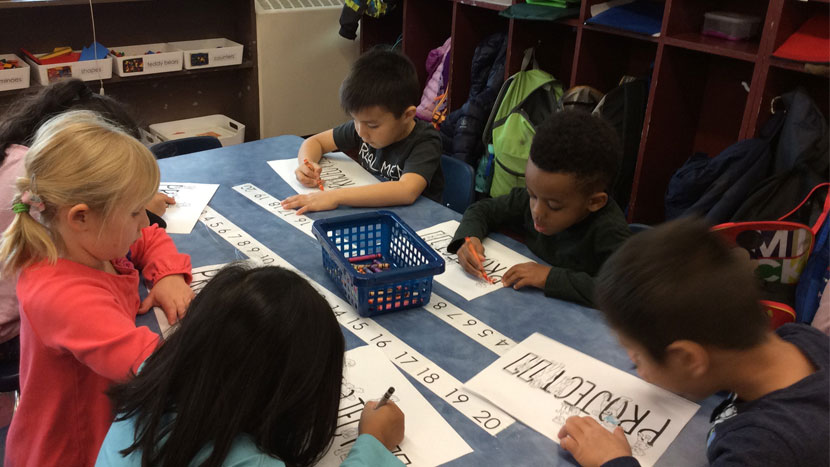12 Days of Giving – Day 2: Giving kindergarten students the tools to cope with their feelings
December 15, 2020 10:00 am
When it comes to mental health, making an impact at a young age and teaching kids various coping strategies is crucial. For Project 11’s curriculum, that starts as early as kindergarten, and the lessons they learn there might just help them throughout their lives.
Harrow School kindergarten teacher Marianna Gigliotti-Cuda is a firm believer in that and has been using Project 11 in her classroom since the early years curriculum launched in fall 2019.
The curriculum doesn’t just prepare the kindergarten students for challenges that they might face down the road, though. It is helping them face the challenges they are experiencing as young children.
Gigliotti-Cuda learned how important mental health is even for kids in kindergarten before she even started teaching Project 11. She had a student in her class whose family had recently immigrated to Canada after fleeing their home country. The student struggled with learning kindergarten basics which made sense once Gigliotti-Cuda learned how much was going on behind the scenes with the family adjusting to life in a new country. Once the weight of that stress was off their shoulders, the student was actually able to focus on learning.
“It was a big teaching point in my career that I need to know all the facts about these kids. We’re always focused on teaching the curriculum, which is valid, but if the kids are not in a stable place, then learning is not going to happen. Once this student knew they were safe and could stay in Canada, they felt like they were free.”
Now that Gigliotti-Cuda teaches the Project 11 curriculum in her class, she sees the benefits of the program with her students every day.
“In class, the kids are like sponges. I’ve been surprised at how they would repeat things in conversations that they retained from the lessons about including friends and inviting others to play. I saw that happening in the classroom all the time,” said Gigliotti-Cuda. “We do a school-wide mindful moment right after recess at lunch, and the kids would come in with the lights off, find a quiet spot and have a mindful moment, do some mindful colouring or yoga. For me, what I’ve noticed with the kids is just that language that’s coming out and being mindful.”
One particular Project 11 concept – the concept of being in green, blue, or red zones with regards to our mood and calming our bodies down – became particularly helpful for one of Gigliotti-Cuda’s students. The message of the lesson was that it’s ok to be in the red zone, but that we should figure out how to get back to the blue or green zones.
“The whole idea is recognizing where you’re at, and when you recognize it, how do we fix it? I had a little boy in the red zone, and we worked at getting him back to the blue and green zones. Seeing him understand the concept was pretty powerful for me. I just watched him physically coming down from the red zone as we talked. The boy physically changed his mood and was proud of himself. It took him a while, but it was a very powerful moment.”
Kids might find those kinds of tools helpful now or further down the road, but the goal is to give kids coping mechanisms that will truly work and help them whenever challenges arise.
“It’s such an important piece of the puzzle,” said Gigliotti-Cuda of learning healthy coping skills. “If the kids don’t have that togetherness and mindfulness, how will they know how to fix the problem? How do you learn how to get out of the red zone if you haven’t been taught how? Students often bring their home challenges to school, and we expect them to learn. There are so many things on teachers’ plates to move learning forward, but this programming is an important piece for teachers to have.”
Of course, right now during a pandemic is one of those times where kids are facing challenges of not getting to see their friends as often and having recreational programming on hold. That’s only made Project 11 more valuable in Gigliotti-Cuda’s opinion.
“I feel like with the rise of anxiety and all that kind of stuff happening in this world, it’s important to teach these kids even just a few strategies. Like the little boy in the red zone, telling them it’s okay to be there and giving them strategies, and every year they’re going to be learning new strategies and developing new coping skills on their own.”
Become a game changer and give teachers like Marianna the chance to impact the lives of young children with valuable programming through Project 11 by DONATING TODAY!
